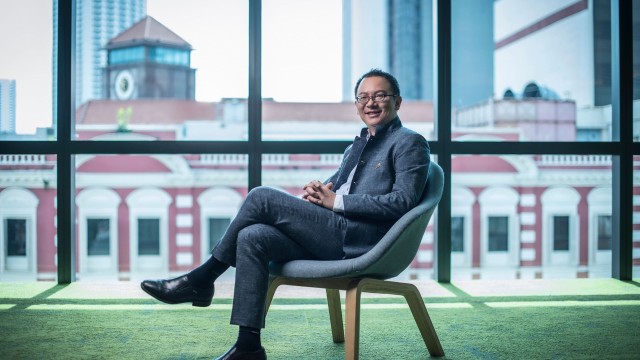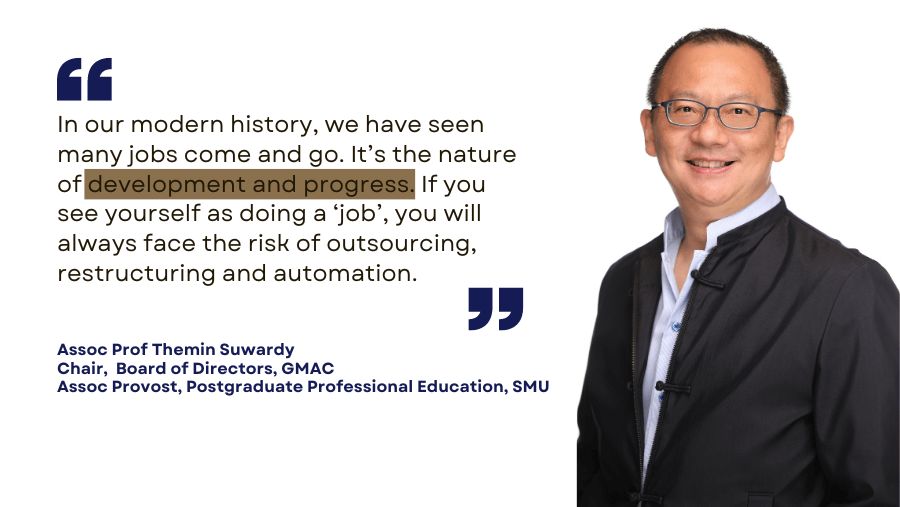
Mastering the Future: New GMAC Chair Themin Suwardy’s Vision for Graduate Education
In today’s fast-paced world, demand for skilled and adaptable leaders has never been more pronounced. One way to remain relevant and adaptable in the new economy is to invest in learning and growth. Associate Professor Themin Suwardy of SMU and Chair of the Board of Directors of the Graduate Management Admission Council advocates for a transformative approach to graduate education that goes beyond packing in mere additional theoretical knowledge.
As the business world charts its course through unprecedented challenges and technological disruptions, the demand for skilled and adaptable leaders has never been more pronounced. Graduate Management Education (GME) equips aspiring leaders with a versatile skill set that blends cutting-edge knowledge, critical thinking, and strategic acumen.
Newly appointed as the Chair of Board of Directors of the Graduate Management Admission Council (GMAC), Associate Professor Themin Suwardy of SMU knows very well how a postgraduate programme can cultivate such leaders. In his capacity as the university’s Associate Provost for Postgraduate Professional Education, Themin advocates for a transformative approach to graduate education that goes beyond packing in mere additional theoretical knowledge.
He added, “Staying ahead in a dynamic and changing environment is really about being able to be ambidextrous with technical knowledge and soft skills. You will need a combination of both to lead and succeed.”
And as post-pandemic workplaces continue to evolve, Themin underscores the importance of continuous learning. He believes that a graduate programme should not only impart technical knowledge but also nurture soft skills crucial for personal and professional growth.
“Learning to work in teams and in a diverse environment, communication, and leadership skills in navigating change are indispensable attributes,” he asserts.
In today’s fast-paced world, where disruptions are the norm and innovation drives progress, the ability to seamlessly navigate both the intricacies of technical expertise and the nuances of effective communication and collaboration is vital. Themin offers a glimpse into the changing dynamics of graduate education and the path to career advancement opportunities.
Envisioning the future of graduate education
Themin’s appointment as Chair of GMAC comes at a time when the GME industry is undergoing significant shifts. Business education trends indicate a decline in domestic applications for MBA studies in the United States, compensated by an increased interest in Asian schools — with the bulk of Asia-Pacific programmes experiencing growth or stability in both domestic and international applications. Furthermore, intensifying competition among schools for high-quality candidates underscores the necessity for innovation and collaboration.
Themin envisions GMAC as a catalyst for progress, emphasising that “providing tools and information necessary for schools and talent to discover and evaluate each other” is essential in the pursuit of excellence in graduate education, for both schools and candidates. The graduate business-schools association’s diverse portfolio — encompassing assessments such as the GMAT exam, market intelligence and professional-development resources — offers schools and candidates the tools necessary to find their best match.
“One example of working together with business schools around the world is the recently updated GME Admissions Reporting Standards,” says Themin.
“It will aid in creating trust and standardising reporting, so candidates can accurately compare across programmes.”
Supporting this perspective, a recent GMAC research report reveals that 9 in 10 graduates believe their GME has increased their employability, and more than two-thirds agree that it has accelerated their career progression.
Tailoring Masters for the new economy
In the face of automation and artificial intelligence, concerns about certain job roles becoming obsolete have surfaced. However, Themin challenges this notion, asserting that continuous growth and investment in capabilities are key to riding the waves of change.
“I never quite understood this fascination with ‘disappearing jobs’,” he quips.
“In our modern history, we have seen many jobs come and go. It’s the nature of development and progress. If you see yourself as doing a ‘job’, you will always face the risk of outsourcing, restructuring and automation.”
Conversely, there lie boundless opportunities in the future job market that cannot even be imagined today. It is no longer about anticipating every twist and turn of the changing tides; instead, the true challenge lies in investing in learning and growth.

For some, this journey may take the form of self-directed learning or engaging in short courses, nurturing their skills to stay relevant and adaptable, Themin elaborates. For those with a desire to drive transformative impact, a graduate programme emerges as a gateway to explore uncharted territories and delve deep into new, adjacent, or advanced realms.
Masters programmes have evolved to cater to the demands of the new economy, offering a spectrum of specialised and interdisciplinary degrees. Discipline-focused programmes, such as accounting, finance, and information technology, equip students with specific technical expertise. Conversely, MBA and general-management degrees provide a holistic understanding of various disciplines, enabling graduates to be versatile and well-rounded managers.
The right time: navigating personal situations and aspirations
When is the right time to do a Masters programme?” is a question that frequently finds its way to Themin at his SMU Masters outreach events, yet a universal answer remains elusive.
The optimal timing depends on each individual’s unique circumstances and aspirations. In fields where a postgraduate degree is a hiring prerequisite, initiating a Masters programme early in one’s career could prove judicious. As Themin aptly articulates, “Many would consider enrolling as soon as they can financially, which explains the surge in younger populations enrolling in Masters programmes nowadays."
However, the decision to take up a Masters is not solely anchored in the pursuit of professional advancement. For some, a Masters programme may become a compelling choice when a change of career path beckons. The desire to venture into new domains and acquire specialised knowledge acts as a magnetic force, propelling them towards fresh and exciting prospects.
Furthermore, for those on a trajectory towards leadership roles, a Masters can serve as a stepping-stone.
As Dr Suwardy states, “Being identified to take over higher level roles that require additional knowledge and skillsets can make a Masters programme an enticing proposition.” It becomes the conduit to unlocking leadership positions, empowering individuals to rise to the occasion with expertise and confidence.
Nonetheless, the timing might be further influenced by various external factors. Work commitments, family obligations, and financial considerations all can play a pivotal role in shaping the decision. The delicate balance of these factors determines the feasibility and practicality of embarking on a Masters journey at a particular juncture in life.
Ultimately, the decision to pursue a Masters programme is a deeply personal one, defined by a fusion of ambition, opportunities, and circumstances.
As Themin concludes, “It is essential to consider where you stand in your career, your aspirations, and your readiness to embrace a transformative learning journey."
Learn more about SMU postgraduate programmes here.



